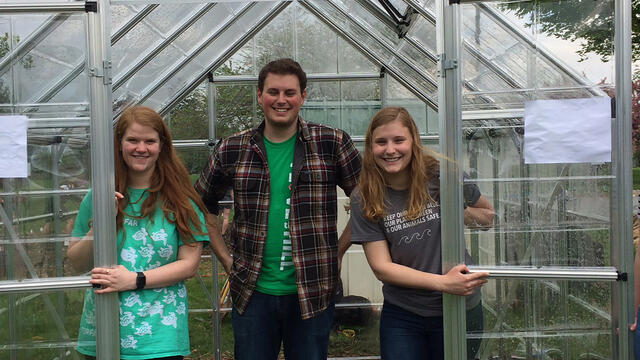Take good care of the Earth: Be a Green-er Terror

McDaniel College students Katie Holland, Atticus Rice and Cari Witherow in the greenhouse they purchased with a Griswold-Zepp grant.
Be a greener Terror. The call-to-action is popping up all over campus like tulips in the spring. “Be a greener Terror” stands proud on an environmental book display in Hoover library and shouts from Earth Week posters and activity tables in Red Square.
Indeed, being a Green Terror is no longer the end game. The new student-originated challenge is to be a greener Terror. It’s the battle cry of an ever-growing group of students who are leading the McDaniel charge toward environmental consciousness and sustainability. Their majors cross all disciplines but their commitment to their cause is united, unwavering and obviously compelling as their numbers continue to grow.
Whether affiliated with the more traditional Compost Club and Green Life Club or Alpha Phi Omega co-ed service fraternity, Progressive Student Union or even the Art department and Live Music Club, McDaniel students are proving every day the power of their belief that one person can make a difference.
Political Science and Communication major Atticus Rice doesn’t ask “why?” but rather “why not?” With juniors Cari Witherow and Katie Holland, Rice received a Griswold-Zepp grant to purchase a greenhouse to be used on campus for educational programming.
“Promoting environmentalism and sustainability is too important of a cause to not do something,” says the senior from Portland, Ore. “Top this outlook off with how easy it is to be a positive force, and there shouldn’t be much stopping anyone from being a change-maker.
“While it’s clear that one or even 100,000 people recycling every day or not using single-use plastics won’t stop climate change from making this planet uninhabitable, inspiring people to take these smaller actions will lead to more large-scale change.”
When Thea Westlake-Stearns arrived on campus from her home in Seattle, Wash., in 2014, she was surprised at how waste management was handled on campus. Although she didn’t consider herself to be particularly interested in the environment on an extreme level, she teamed with another student, Sylvan Greyson, to launch a Compost Club.
“When I realized that composting was not available in many parts of Maryland, I knew that I wanted to make a change on our campus and see how far that change could spread,” says Westlake-Stearns, a senior Business Administration, Spanish and Economics triple major. “My hope with the composting program is that it has encouraged people to learn about more sustainable waste management, and serves as an example that anyone, even a small college, can compost.”
This year, junior Haley Chan joined forces with Westlake-Stearns to win and use a Griswold-Zepp grant for the Compost Club to enhance composting education and opportunities on campus. Among their initiatives is the Earth Day Eco-Fair held April 22 in partnership with Green Life and other campus organizations.
Students stopped by Eco Fair tables to make homes for non-colonizing bees out of plastic bottles and bamboo, to plant seeds with compost in compostable egg carton planters, to create Earth Day art and postcards and nature-themed cyanotypes. They also practiced sorting trash, recycling and compost — and received re-usable tote bags.
Chan, an Elementary Education major, was introduced to conservation and fossil fuel alternatives during a high school AP Environmental Science course, and began learning that she could make a difference by adjusting her lifestyle. Most people, she found, think that they can only make a substantial difference by writing to Congress or boycotting big business — grand acts on a large scale which often feel impersonal and unattainable.
“Joining Compost Club in my sophomore year was truly one of the best decisions of my life,” says the junior from Charlottesville, Va. “What touches me most is knowing that by making small, low-pressure adjustments to my lifestyle, I am saving the environment.
“To see and know the outcome of small but conscious choices is heartening to me, and I think is exactly how to go about forming a caring community dedicated to any cause.”
At the April 26 opening of the Green (Greener?) Terror greenhouse, under a tornado watch and pelting thunderstorms, Holland and Green Life president Witherow joined Rice in celebrating another step toward becoming greener Terrors. Nearby, clearing and cultivating the campus garden, were students from Environmental Studies professor Elly Engle’s “Sustainable Agriculture” class.
“With Green Life, I hope to encourage the students here on campus to take small steps to live more sustainably and encourage others to do the same,” says Witherow, a junior Biology major with an Environmental Studies minor from Camp Hill, Pa. “Childhood is the best time to start — this is why we’re hoping to bring children to the greenhouse for environmental programming — but college is a good second time, because this when we start living on our own and developing habits that we’ll keep with us for the rest of our lives and maybe even pass on to our children.”
Junior Katie Holland has always loved the environment and wanted to be part of the movement to develop and promote environmental sustainability on McDaniel’s campus and the local community.
“The state of the environment is an issue that affects all of us,” says Holland, a Chemistry major from Charlotte Hall, Md. “It’s not going to improve unless people, like those in Green Life, are dedicated to trying to make a difference.”
McDaniel College students (l-r) Katie Holland, Atticus Rice and Cari Witherow at the new greenhouse they purchased with their Griswold-Zepp award to use for educational programming.